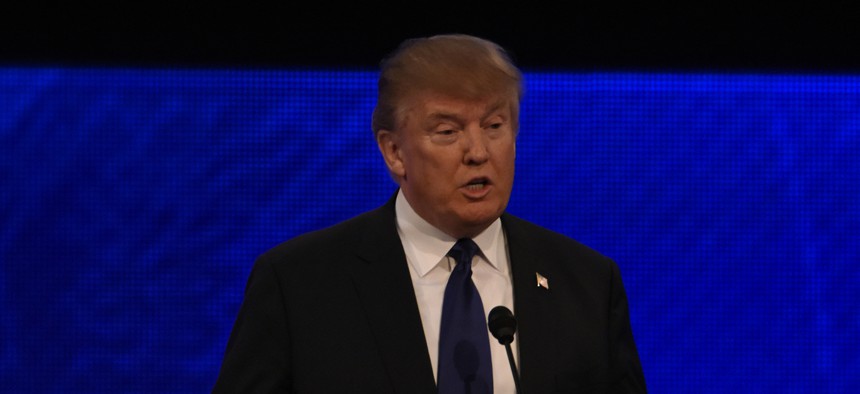
Ida Mae Astute/ABC News
Donald Trump's Claims About Torture Are False
Why does the Republican candidate say it’s a useful tactic when all evidence suggests otherwise?
No one, or almost no one, is willing to say they support torture outright. The people who will defend its use often employ one or both of two strategies: Either they argue that the techniques they encourage aren’t really torture, or they argue that torture is generally bad but it’s necessary in certain, dire circumstances.
Donald Trump is, as on so many topics, an outlier. Here’s what he said on Wednesday:
Torture works. OK, folks? You know, I have these guys—“Torture doesn't work!”—believe me, it works. And waterboarding is your minor form. Some people say it's not actually torture. Let's assume it is. But they asked me the question: What do you think of waterboarding? Absolutely fine. But we should go much stronger than waterboarding. That's the way I feel. They're chopping off heads. Believe me, we should go much stronger, because our country's in trouble. We're in danger. We have people that want to do really bad things!
Since Trump is willing to grant that waterboarding is a form of torture, he’s dispensed with the first strategy. But what about the assertion that “torture works”? Aside from the rather menacing “believe me,” Trump offers no evidence to back it up.
This was a major battle during the George W. Bush years and early Obama years. But now there’s a body of evidence as to whether waterboarding was an effective tool: a Senate Intelligence Committee report on the CIA’s use of it and other “enhanced interrogation techniques.” Most of the report remains classified, but the executive summary kicks off with this finding:
#1: The CIA's use of its enhanced interrogation techniques was not an effective means of acquiring intelligence or gaining cooperation from detainees.
Here’s the immediate point after:
#2: The CIA's justification for the use of its enhanced interrogation techniques rested on inaccurate claims of their effectiveness.
Despite their use against at least 39 detainees, there’s still no evidence that “enhanced interrogation” methods produced information useful to stopping terror attacks, while there’s plenty of evidence that those subject to torture produced false information in the hopes of ending their ordeals. If torture works, wouldn’t torture have worked?
Where is Trump getting this stuff? It’s impossible to know, especially because it’s unclear who, if anyone, is advising Trump on foreign-policy issues. But one reason why the idea that torture is effective remains current is its circulation in pop culture. For example, Zero Dark Thirty, the film about the killing of Osama bin Laden, suggested key intelligence to catching the al-Qaeda leader had been procured via torture. That led acting CIA Director Michael Morrell to write a memo to employees stating otherwise. “The film creates the strong impression that the enhanced interrogation techniques that were part of our former detention and interrogation program were the key to finding Bin Laden," he wrote. "That impression is false."
A common variation on this theme is the “ticking time-bomb” case—another staple of Hollywood representations. But as my colleague Conor Friedersdorf has written, that scenario is a chimera: “No one can cite even a single terrorist attack that has been stopped, or could have been stopped, with torture in this manner. Scour all of history and you come up empty. Little wonder that it's always invoked as a hypothetical, not a cautionary tale. Who can prove it won't ever happen?”
The case against torture is both moral and factual. Trump isn’t just out of the mainstream in boosting torture, though. His position that the barbarism of terrorists demands to be met with barbarism, for barbarism’s sake, is the sort of idea it shouldn’t require a Senate report to reject.






